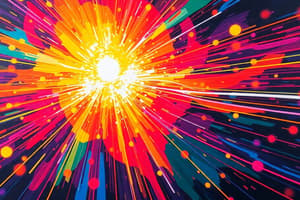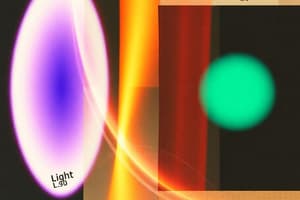Podcast
Questions and Answers
The bending of light when it goes from one medium to another is called what?
The bending of light when it goes from one medium to another is called what?
- Superposition
- Reflection
- Refraction (correct)
- Total internal reflection
What is the definition of a real image?
What is the definition of a real image?
- Always located behind the mirror
- Formed by apparent intersection of light rays
- Only produced by convex mirrors
- Result of light rays actually intersecting (correct)
Which of the following formulas can be used to find refractive indexes.
Which of the following formulas can be used to find refractive indexes.
- 1/sin(C)
- Real depth/ Apparent Depth
- Velocity in median 1 divided by velocity in median 2
- All of the above (correct)
Which type of reflection occurs off a rough surface?
Which type of reflection occurs off a rough surface?
In which plane do the incident ray, normal at the point of incidence, and reflected ray lie according to the Laws of Reflection?
In which plane do the incident ray, normal at the point of incidence, and reflected ray lie according to the Laws of Reflection?
What type of mirror is commonly used in supermarkets and cars?
What type of mirror is commonly used in supermarkets and cars?
Which law states that the ratio of the sine of the angle of incidence to the sine of the angle of refraction is a constant for two given media?
Which law states that the ratio of the sine of the angle of incidence to the sine of the angle of refraction is a constant for two given media?
What is the formula used to calculate the power of a lens?
What is the formula used to calculate the power of a lens?
What type of image can be produced by a concave mirror when the object is inside f?
What type of image can be produced by a concave mirror when the object is inside f?
What happens to light going from a denser to a rarer medium?
What happens to light going from a denser to a rarer medium?
Flashcards are hidden until you start studying
Study Notes
Light and its Properties
- Light is a form of energy that travels at a speed of approximately 3 x 10^8 ms^-1.
- Light exhibits wave-like nature and undergoes five wave phenomena.
Reflection of Light
- Reflection is the bouncing of light off an object.
- Refractive Index of a Medium is the ratio of the sine of the angle of incidence to the sine of the angle of refraction.
- Types of reflection:
- Diffuse Reflection: scattering of light in all directions off a rough surface.
- Regular Reflection: reflection of light off smooth surfaces like mirrors.
Laws of Reflection
- Law 1: The incident ray, the normal at the point of incidence, and the reflected ray all lie in the same plane.
- Law 2: The angle of incidence is equal to the angle of reflection (i = r).
Spherical Mirrors
- Concave mirrors:
- Produce Real and Virtual images.
- Used by dentists and in floodlights.
- Convex mirrors:
- Produce only Virtual images.
- Used in supermarkets and cars to provide a wide field of view.
- Properties of mirror images:
- For a convex mirror: image is always virtual and located behind the mirror, always diminished, and size increases as object moves closer.
- For a concave mirror: image is real and located in front of the mirror if object is outside the focus, and virtual and located behind the mirror if object is inside or at the focus.
Refraction of Light
- Refraction is the bending of a ray of light when it goes from one medium to another.
- Laws of Refraction:
- Law 1: The incidence ray, normal, and the refracted ray are all in the same plane.
- Law 2: The ratio of the sine of the angle of incidence to the sine of the angle of refraction is a constant for two given media (Snell's Law).
Total Internal Reflection and Optical Fibres
- Optical fibre: a very thin transparent rod through which light can travel by total internal reflection.
- Refractive index (n) = real depth / apparent depth = velocity in medium 1 / velocity in medium 2 = 1 / sinC = sin(i) / sin(r).
Lenses
- Types of lenses:
- Concave lenses (diverging): produce Virtual images.
- Convex lenses (converging): produce Real and Virtual images.
- Formula: 1 / f = 1 / u + 1 / v.
- Power of a lens: 1 / f.
- Power of a combination of lenses: P = P1 + P2.
The Human Eye
- The human eye uses a lens which, alongside the cornea, produces a converging system.
Studying That Suits You
Use AI to generate personalized quizzes and flashcards to suit your learning preferences.




